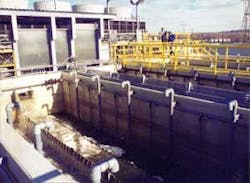Power Plant Uses Reclaimed Water For Reuse in Cooling Towers
PSEG Power has awarded USFilter a $1.2 million contract for a system to filter reclaimed water for reuse in cooling towers at its Linden Combined Cycle Plant in New Jersey
USFilter is supplying Hydro-Clear® pulsed bed sand filters, designed to treat an average (24-hour basis) flow of 4,200 gpm of reclaimed water from the Linden-Roselle (N.J.) Sewerage Authority wastewater treatment plant. The filtration system, supplied by USFilter's Zimpro Products, Rothschild, WI, will consist of seven cells in concrete tanks and will be located on the sewerage authority property.
After filtration, the reclaimed water will be pumped approximately one mile to the Linden power station. It will be treated further to prevent scaling and foaming, and then made available for two 10-cell mechanical draft cooling towers.
According to Chris Krawice, project engineer for PSEG Power's Reclaimed Water Project, the beneficial reuse of reclaimed water reduces the power station's dependence on potable water while assuring a reliable, continuous source of water.
"A number of factors drive reuse of reclaimed water," he said. "These include the cost of potable water, closeness of the source, the current drought, and the New Jersey DEP guidelines for beneficial reuse of reclaimed water."
Reclaimed water, according to the New Jersey Department of Environmental Protection (NJDEP), is treated effluent from municipal wastewater treatment plants, which can be reused instead of discharged into receiving streams.
The importance of Reclaimed Water for Beneficial Reuse (RWBR) programs came to light during the drought of 1999, when the state experienced firsthand the importance of protecting and conserving potable water supplies.
"RWBR involves taking what was once considered waste, giving it a high degree of treatment, and using the resulting high-quality reclaimed water for new beneficial uses," the department explained in its Technical Manual on the subject.
PSEG Power is a leader in using reclaimed water for cooling and other power station needs. The company has been using Hydro-Clear® filters for more than six years for a similar application at its Bergen power station.
PSEG Power is one of the nation's largest independent power producers with approximately 16,000 megawatts of electric generating capacity in operation or construction. Power is a subsidiary of Public Service Enterprise Group Inc., a diversified energy holding company with more than $25 billion in assets.

